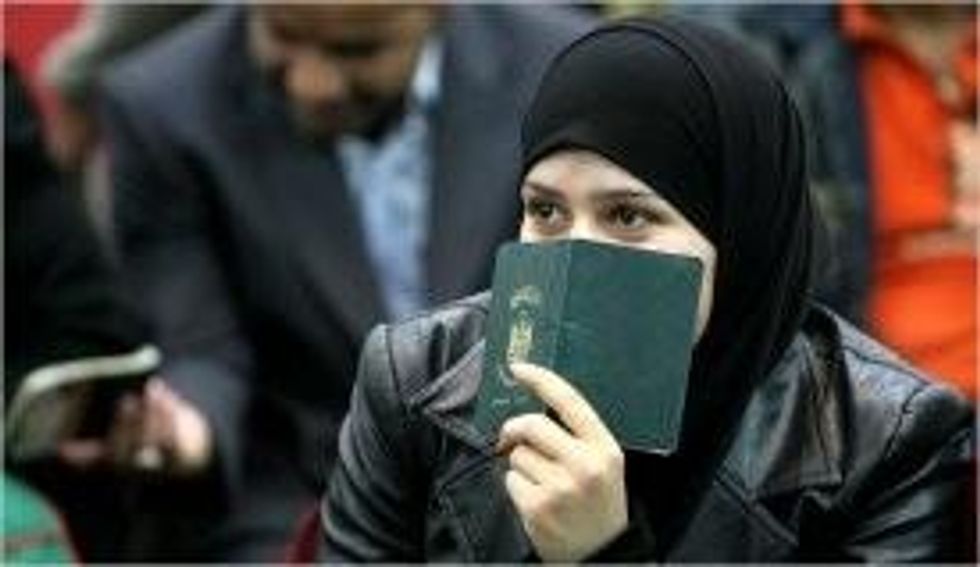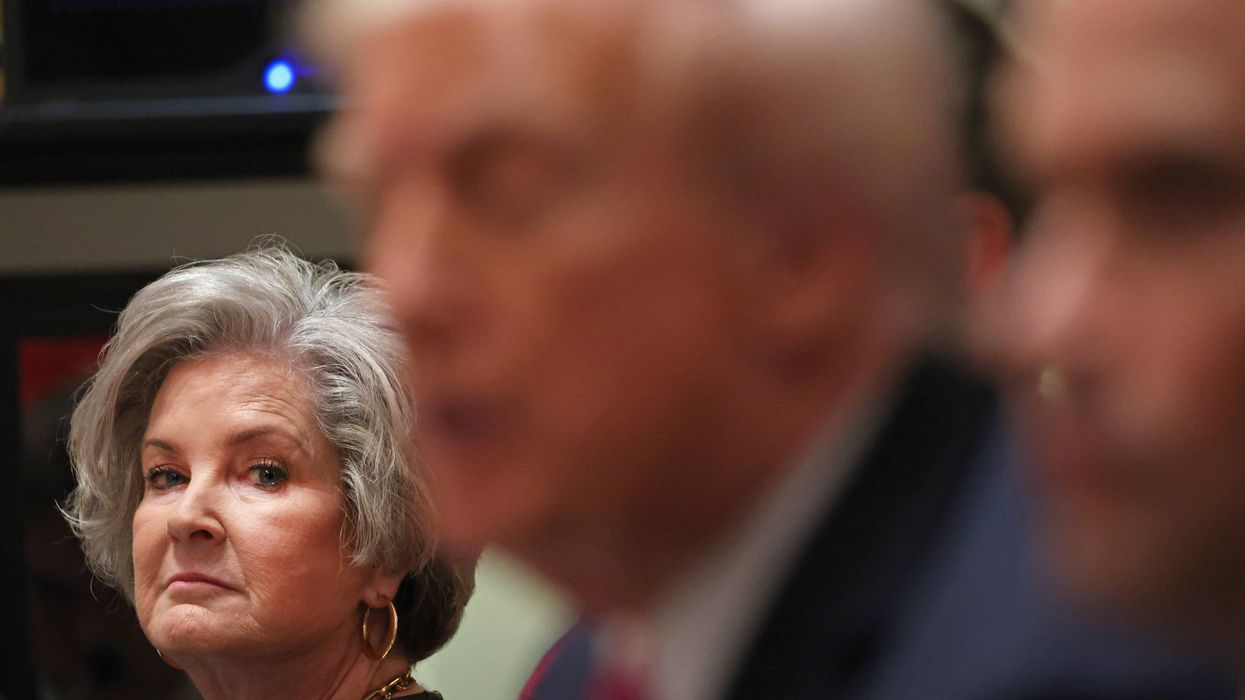April, 08 2013, 12:09pm EDT
For Immediate Release
Contact:
Sam Husseini, (202) 347-0020; or David Zupan, (541) 484-9167
"I'm a Nation to Myself:" Iraqi Refugees in the United States
Ten years after U.S. forces cemented their victory over Iraq by toppling the statue of Saddam Hussein in Firdos Square on April 9, 2003, Iraqis continue to flee their country, adding to the estimated 4 million displaced by the war and occupation. The Progressive magazine has a new report on the largest community of Iraqi refugees in the United States who've fled as a result of the U.S. war and occupation.
WASHINGTON

ARUN GUPTA, @arunindy
Author of the piece, Gupta co-founded The Indypendent newspaper and The Occupied Wall Street Journal. He is a regular contributor to The Progressive, Truthout, In These Times and The Guardian. He recently travelled to El Cajon, California, a bedroom community east of San Diego, where more than 12,000 Iraqis have arrived since 2008, after the government relaxed restrictions. He writes, "Many Iraqis in El Cajon worked for the U.S. government in Iraq and fled with their families after their lives were threatened. In return they expected a warm welcome and a decent standard of living when they arrived. Instead they were in for a rude awakening. Their meager monthly stipend means they get the worst apartments in El Cajon, a city with a 23 percent poverty rate, and have to rely on donations for furniture. Almost all are traumatized from the violence they experienced, but they are told to get jobs right away or they will lose their benefits. With 11 percent unemployment in the city they take jobs no one else will--fast food, housecleaning, parking-lot attendants. Many are doctors, accounts and engineers.
Social workers say, "You look at their faces. They are so proud of their degrees and their experience, and then they are told to clean sixteen hotel rooms a day. The refugees need more aid, more educational programs, cultural orientation and time to recover and adjust." Gupta adds, "Of Iraqi adults who've arrived since 2009, 67 percent are unemployed. In a time of austerity many Iraqis are nearing the four-year limit of welfare assistance, and worry they will wind up homeless, living on the sidewalk."
SALAM HASSAN
A thirty-seven-old-year computer engineer living in Berkeley, Hassan served as a fixer in Baghdad for journalists like Naomi Klein, Dahr Jamail, and Christian Parenti before escaping mortal danger in 2005. He said single male refugees in the Bay Area wind up in West Oakland, "famous for violent history, because it's poor, and the rent is cheaper." Hassan, who has taken so many refugees under his wing that his apartment was dubbed "the Iraqi Embassy," says they are packed "three to four people per one-bedroom apartment. They get four months assistance, then are switched to a program that just covers their rent and $200 a month for food stamps."
A nationwide consortium, the Institute for Public Accuracy (IPA) represents an unprecedented effort to bring other voices to the mass-media table often dominated by a few major think tanks. IPA works to broaden public discourse in mainstream media, while building communication with alternative media outlets and grassroots activists.
LATEST NEWS
Social Security Administration 'In Turmoil' as New Reporting Details Damage Done by Trump Cuts
In-depth reporting from the Washington Post found the Social Security Administration is dealing with "record backlogs that have delayed basic services to millions of customers."
Dec 30, 2025
An in-depth report published by the Washington Post on Tuesday offers new details about the damage being done to the Social Security Administration during President Donald Trump's second term.
The Post, citing both internal documents and interviews with insiders, reported that the Social Security Administration (SSA) is "in turmoil" one year into Trump's second term, resulting in a customer service system that has "deteriorated."
The chaos at the SSA started in February when the Trump administration announced plans to lay off 7,000 SSA employees, or roughly 12% of the total workforce.
This set off a cascade of events that the Post writes has left the agency with "record backlogs that have delayed basic services to millions of customers," as the remaining SSA workforce has "struggled to respond to up to 6 million pending cases in its processing centers and 12 million transactions in its field offices."
The most immediate consequence of the staffing cuts was that call wait times for Social Security beneficiaries surged to an average of roughly two-and-a-half hours, which forced the agency to pull workers employed in other divisions in the department off their jobs.
However, the Post's sources said these employees "were thrown in with minimal training... and found themselves unable to answer much beyond basic questions."
One longtime SSA employee told the Post that management at the agency "offered minimal training and basically threw [transferred employees] in to sink or swim."
Although the administration has succeeded in getting call hold times down from their peaks, shuffling so many employees out of their original positions has damaged the SSA in other areas, the Post revealed.
Jordan Harwell, a Montana field office employee who is president of American Federation of Government Employees (AFGE) Local 4012, said that workers in his office no longer have the same time they used to have to process pay stubs, disability claims, and appointment requests because they are constantly manning the phones.
An anonymous employee in an Indiana field office told the Post that she has similarly had to let other work pile up as the administration has emphasized answering phones over everything else.
Among other things, reported the Post, she now has less time to handle "calls from people asking about decisions in their cases, claims filed online, and anyone who tries to submit forms to Social Security—like proof of marriage—through snail mail."
Also hampering the SSA's work have been new regulations put in place by Tesla CEO Elon Musk's Department of Government Efficiency that bar beneficiaries from making changes to their direct deposit information over the phone, instead requiring them to either appear in person at a field office or go online.
The Indiana SSA worker told the Post of a recent case involving a 75-year-old man who recently suffered a major stroke that left him unable to drive to the local field office to verify information needed to change his banking information. The man also said he did not have access to a computer to help him change the information online.
"I had to sit there on the phone and tell this guy, 'You have to find someone to come in... or, do you have a relative with a computer who can help you or something like that?'" the employee said. "He was just like, 'No, no, no.'"
Social Security was a regular target for Musk during his tenure working for the Trump administration, and he repeatedly made baseless claims that the entire program was riddled with fraud, even referring to it as "the biggest Ponzi scheme of all time."
Keep ReadingShow Less
Mamdani Inauguration Set for Site Befitting Public Transit Champion
Fellow democratic socialists Alexandria Ocasio-Cortez and Bernie Sanders will feature prominently in the swearing-in of New York City's next mayor.
Dec 30, 2025
Democratic New York City Mayor-elect Zohran Mamdani's inauguration Thursday will feature luminaries of the left including US Sen. Bernie Sanders and Congresswoman Alexandria Ocasio-Cortez, who will gather to swear in the democratic socialist in a location befitting a candidate who ran on a transit-forward platform.
Mamdani will be officially sworn by Democratic New York Attorney General Letitia James during a private ceremony attended by members of his family in the abandoned—but well-preserved—Old City Hall subway station, Streetsblog first reported.
"When Old City Hall Station first opened in 1904—one of New York’s 28 original subway stations—it was a physical monument to a city that dared to be both beautiful and build great things that would transform working peoples’ lives," Mamdani said in a statement.
"That ambition need not be a memory confined only to our past, nor must it be isolated only to the tunnels beneath City Hall: It will be the purpose of the administration fortunate enough to serve New Yorkers from the building above," he added.
Mamdan ran on a platform of fare-free city buses—to be funded by tax hikes on corporations and wealthy individuals—improved public transit performance, sustainability and emissions reduction, technology-enhanced mobility, and multimodal integration.
"When I take my oath from the station at the dawn of the New Year, I will do so humbled by the opportunity to lead millions of New Yorkers into a new era of opportunity, and honored to carry forward our city’s legacy of greatness," Mamdani said.
Mamdani is set to be ceremoniously sworn in at a 1:00 pm public event at City Hall alongside incoming Comptroller Mark Levine and reelected Public Advocate Jumaane Williams, both Democrats. CNN reported Tuesday that Mamdani will be introduced by Ocasio-Cortez (D-NY).
“For the many New Yorkers who have long felt betrayed by a broken status quo, Congresswoman Alexandria Ocasio-Cortez embodies a new kind of politics that puts working people at the heart of it,” Mamdani said in a statement.
“I’ve been so proud to count her as a partner across the many stages of our people-powered movement—from the primary campaign to our Forest Hills rally in October to the very first day of the transition—and I’m honored that she’ll be a part of our historic City Hall inauguration," he added.
Sanders (I-Vt.) will subsequently administer the oath of office to Mamdani.
“His victory is not just about one city or one election, it is about the strength of a working-class movement that says unequivocally: The future of New York belongs to the people, not the billionaire class," Sanders said last week of Mamdani. "It is my honor to swear him in as the next mayor of New York City.”
Streetsblog reported that the ceremonial inauguration will take place alongside a car-free block party on Broadway.
While Republicans—and plenty of so-called "moderate" Democrats—are unnerved by the prospect of Mamdani's mayordom, a recent Rasmussen survey found that a majority of all US voters under the age of 40 want a democratic socialist to be the next president of the United States.
"A significant majority of Americans are sick of the neoliberal 'let the rich run things because they know best' bullshit that Republicans, 'tech bros,' and a shrinking minority of on-the-take Democratic politicians embrace," frequent Common Dreams opinion contributor Thom Hartmann wrote last week.
"The exploding popularity of progressive politicians from Zorhan Mamdani to Bernie Sanders, [Democratic Texas Congresswoman] Jasmine Crockett, and Alexandria Ocasio-Cortez aren’t an anomaly," he added, "they’re a signpost to both electoral and governing success for the next generation of genuinely progressive Democratic politicians."
Keep ReadingShow Less
Senate Dems Want to Know How Trump's Chief of Staff Got Access to Epstein Files
With the Justice Department under fire for how it's handled the documents, the senators asked Susie Wiles to describe her "role in any process related to the review, redaction, withholding, or release of material."
Dec 30, 2025
Two Democratic leaders in the US Senate revealed Tuesday that they're demanding answers from the White House chief of staff, Susie Wiles, about her access to federal files on deceased sex offender Jeffrey Epstein and whether she's involved in their "bungled and potentially illegal partial release."
President Donald Trump had a well-documented friendship with Epstein—at least until a reported falling out in 2004. Although the president ultimately signed the Epstein Files Transparency Act, it came after he faced intense criticism for his administration not willingly releasing the records, and congressional Republicans delayed passage of the bill, which requires the US Department of Justice (DOJ) to publish materials related to the late financier's sex trafficking case.
Senate Judiciary Committee Ranking Member Dick Durbin (D-Ill.) and Sen. Sheldon Whitehouse (D-RI), ranking member for the Subcommittee on Federal Courts, Oversight, Agency Action, and Federal Rights, began their letter to Wiles by pointing to a two-part Vanity Fair series featuring interviews with Trump's top advisers, including Wiles.
As Chris Whipple reported:
Wiles told me she'd read what she calls "the Epstein file." And, she said, "[Trump] is in the file. And we know he's in the file. And he's not in the file doing anything awful." Wiles said that Trump "was on [Epstein's] plane… he's on the manifest. They were, you know, sort of young, single, whatever—I know it's a passé word but sort of young, single playboys together."
Noting those remarks, the senators wrote to Wiles, "Please be kind enough to explain when and where and under what authority you gained access to this material."
They also sent Wiles the list of questions below and requested her response by January 5:
- What were the materials in "the Epstein file" you referred to in your Vanity Fair interview?
- Had material in the file you reviewed been presented to a grand jury?
- When did you first gain access to "the Epstein file" and what was the schedule of your review of it?
- For what purpose did you gain access to this information?
- Did you share with President Trump any information contained in the file you reviewed?
- Please describe your role in any process related to the review, redaction, withholding, or release of material in the "Epstein file," including any processes involving the Department of Justice or Federal Bureau of Investigation.
The letter is dated December 22, just three days after the deadline set by the Epstein Files Transparency Act. The DOJ has missed the deadline, released files in batches, and faced scrutiny for redactions.
Keep ReadingShow Less
Most Popular


